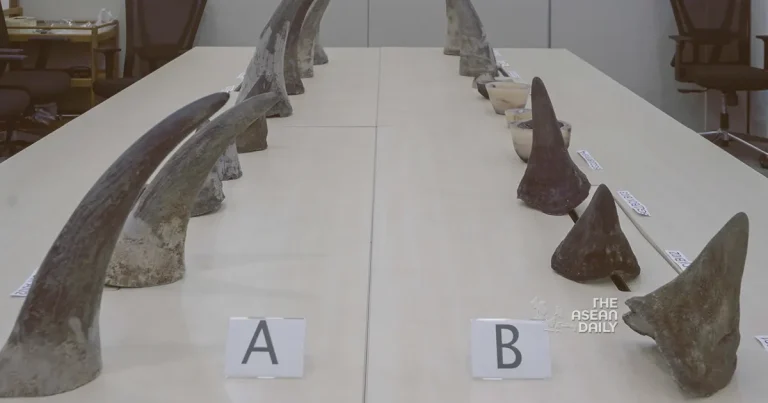29-1-2024 (SINGAPORE) A South African man has been sentenced to two years in jail for smuggling rhino horns worth S$1.2 million through Changi Airport, marking the heaviest sentence for wildlife smuggling in Singapore to date. The accused, 33-year-old Gumede Sthembiso Joel, pleaded guilty to two charges under the Endangered Species (Import and Export) Act for transiting in Singapore with the rhino horns without a valid permit. His final destination was Laos.
On January 26, Joel was sentenced after airport security and the National Parks Board’s (NParks) K9 Unit discovered 34.7 kilograms of rhino horns in two pieces of baggage. A total of 20 pieces of rhinoceros horns were seized, with 18 pieces identified as originating from 15 different white rhinoceroses and two pieces from black rhinoceroses. Rhinoceroses are classified as Appendix I species under the Convention on International Trade in Endangered Species of Wild Fauna and Flora (CITES), making their international trade prohibited due to their endangered status.
The investigation revealed that Joel had assistance from another South African man named Jaycee Israel Marvatona, who was allegedly involved in the illegal rhino horn trade. NParks, in collaboration with the Commercial Affairs Department (CAD) of the Singapore Police Force and INTERPOL, deployed officers to South Africa for further investigations and evidence analysis. It was discovered that Jaycee had asked Joel to transport the horns, providing him with flight tickets and cash. Joel left South Africa on October 3, 2022, and was apprehended in Singapore the following day.
Under the Endangered Species (Import and Export) Act, individuals found in possession of CITES-scheduled Appendix I species while transiting through Singapore without a valid CITES permit can face fines of up to S$50,000 for each scheduled species in transit (not exceeding S$500,000) and/or imprisonment for up to two years. These penalties also apply to those found in possession or transporting CITES-scheduled Appendix I species, including their parts and derivatives.
NParks emphasized Singapore’s zero-tolerance stance on the illegal wildlife trade and reiterated the importance of collaborative efforts in regulating and enforcing against such crimes.




